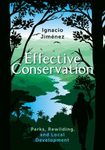![Civilizing Nature Civilizing Nature]()
Click to have a closer look
About this book
Contents
Customer reviews
Biography
Related titles
About this book
National Parks are one of the most important and successful institutions in global environmentalism. Since their first designation in the United States in the 1860s and 1870s they have become a global phenomenon. The development of this multitude of ecological as well as political systems cannot be understood as a simple reaction to mounting environmental problems, nor can it be explained by the spread of environmental sensibilities. Shifting the focus from the usual emphasis on the National Parks in the United States, Civilizing Nature adopts an historical and transnational perspective on the global geography of protected areas and its changes over time. It focuses especially on the actors, networks, mechanisms, arenas, and institutions responsible for the global spread of the National Park and the associated utilization and mobilization of asymmetrical relationships of power and knowledge and makes a benchmark contribution to scholarly discussions of globalization and the emergence of both global environmental institutions and governance.
Contents
Preface
List of Tables, Maps and Illustrations
List of Abbreviations
Acknowledgements
Introduction: Towards a Global History of National Parks
PART I: PARKS AND EMPIRES
Chapter 1. Unpacking Yellowstone: The American National Park in Global Perspective
Chapter 2. How National Were the First National Parks? Comparative Perspectives from the British Settler Societies
Chapter 3. Imperial Preservation and Landscape Reclamation: National Parks and Natural Reserves in French Colonial Africa
Chapter 4. From Colonial Imposition to National Icon: Malaysia's Taman Negara National Park
Chapter 5. A Bavarian Serengeti: Space, race and time in the entangled history of nature conservation in East Africa and Germany
PART II: ORGANIZATIONS AND NETWORKS
Chapter 6. Translating Yellowstone: Early European National Parks, Weltnaturschutz and the Swiss Model
Chapter 7. Framing the Heritage of Mankind: National Parks on the International Agenda
Chapter 8. Global Values, Local Politics: Inuit Internationalism and the Establishment of Northern Yukon National Park
Chapter 9. Demarcating Wilderness and Disciplining Wildlife: Radiotracking Large Carnivores in Yellowstone and ChitwanNational Parks
PART III: NATIONS AND NATURES
Chapter 10. A Revolutionary Civilization: National Parks, Transnational Exchanges, and the Construction of Modern Mexico
Chapter 11. Parks without Wilderness, Wilderness without Parks? Assigning National Park status to Dutch Man-made Landscapes and Colonial Game Reserves
Chapter 12. Globalizing Nature: National Parks, Tiger Reserves, and Biosphere Reserves in Independent India
Chapter 13. Slovenia's Triglav National Park: From Imperial Borderland to National Ethnoscape
Epilogue: National Parks, Civilization and Globalization
Select Bibliography
Customer Reviews
Biography
Bernhard Gissibl is Lecturer at the Department of History, University of Mannheim. His dissertation explored the history of hunting and wildlife conservation in colonial Tanzania.
Sabine Höhler is Associate Professor of Science and Technology Studies at the Royal Institute of Technology in Stockholm. Her recent study on "Spaceship Earth" explores global concepts of environmental carrying capacity and life support between 1960 and 1990.
Patrick Kupper is Senior Lecturer at ETH Zurich. His most recent book, published in 2012, is a transnational history of the Swiss National Park.






































